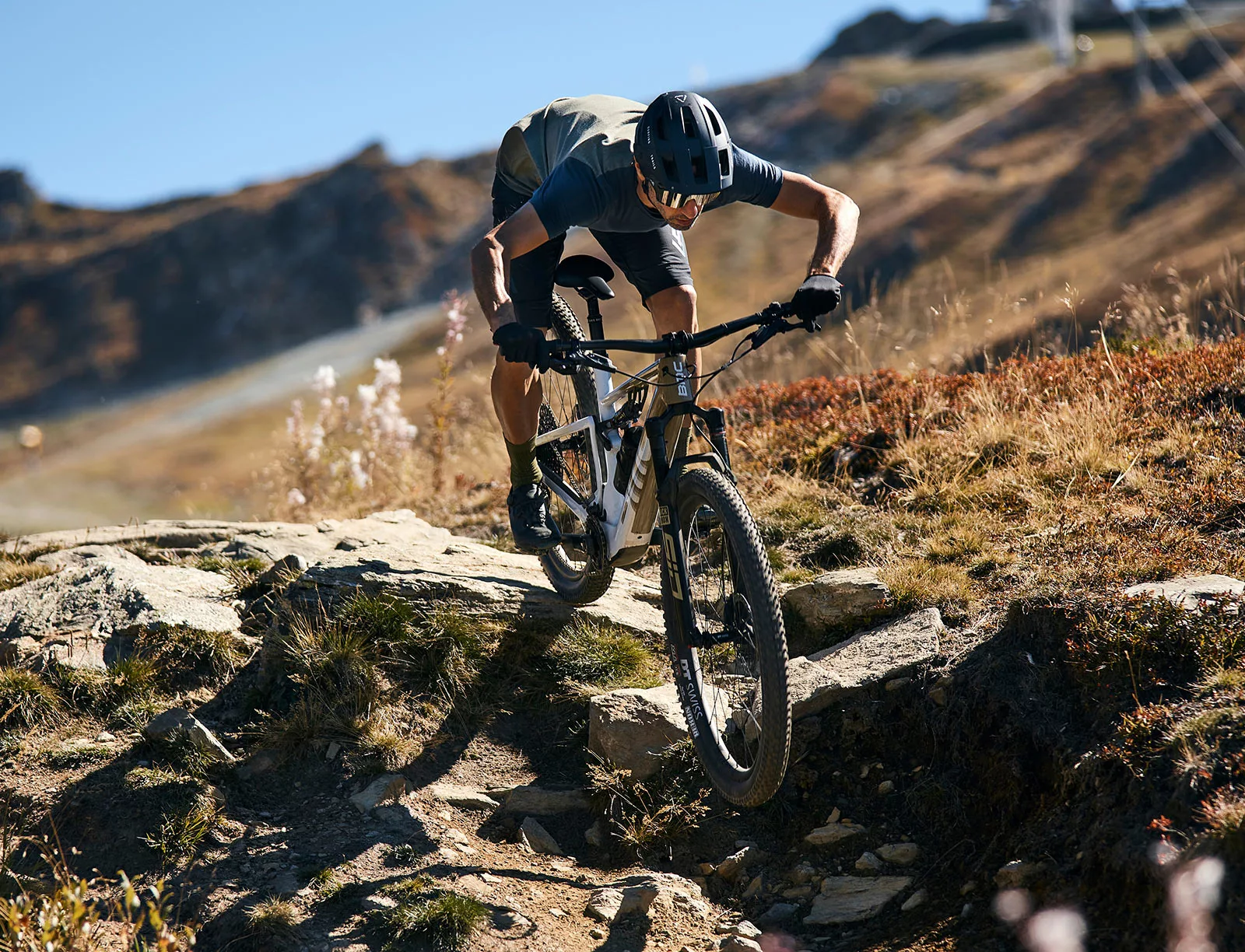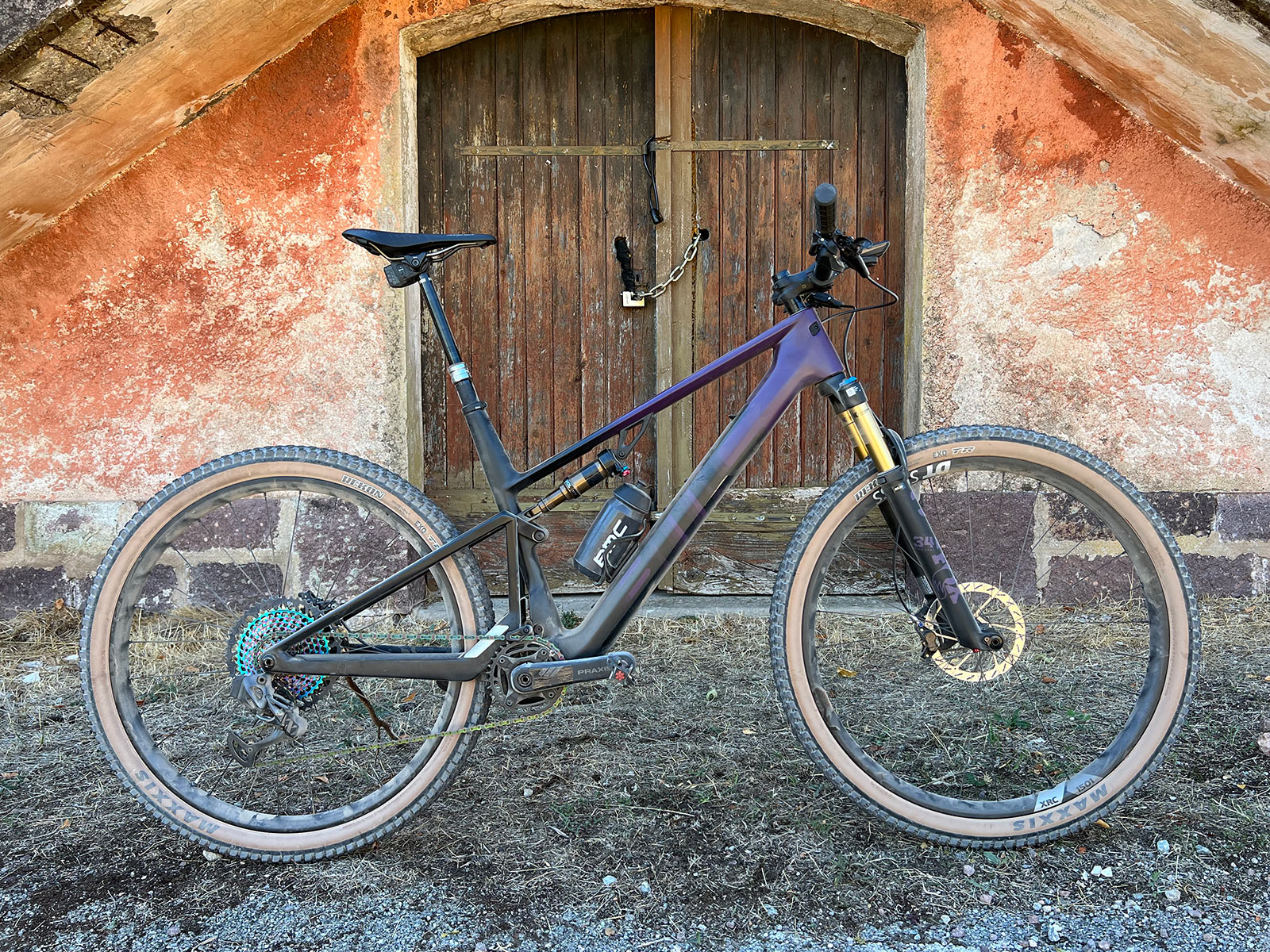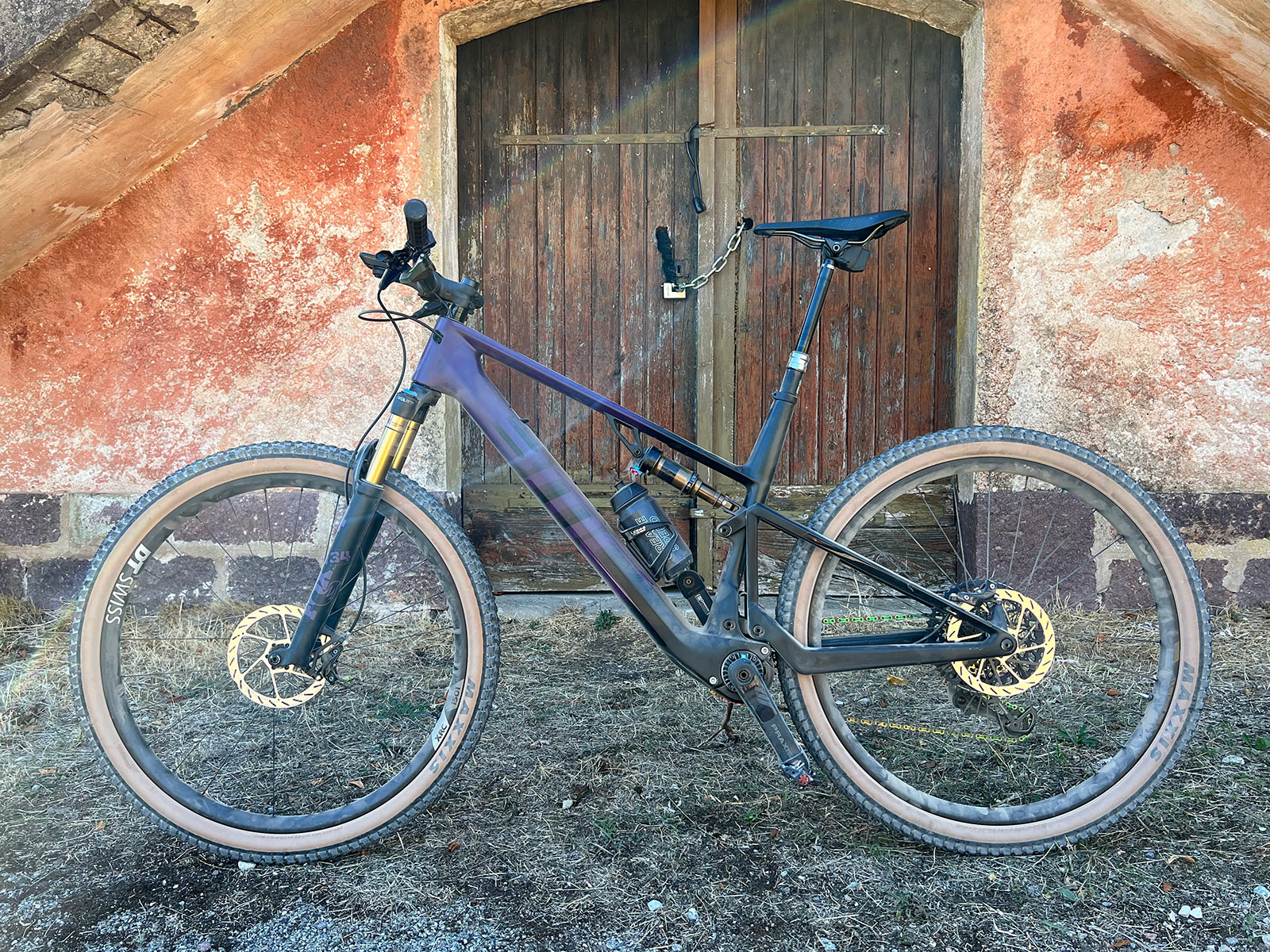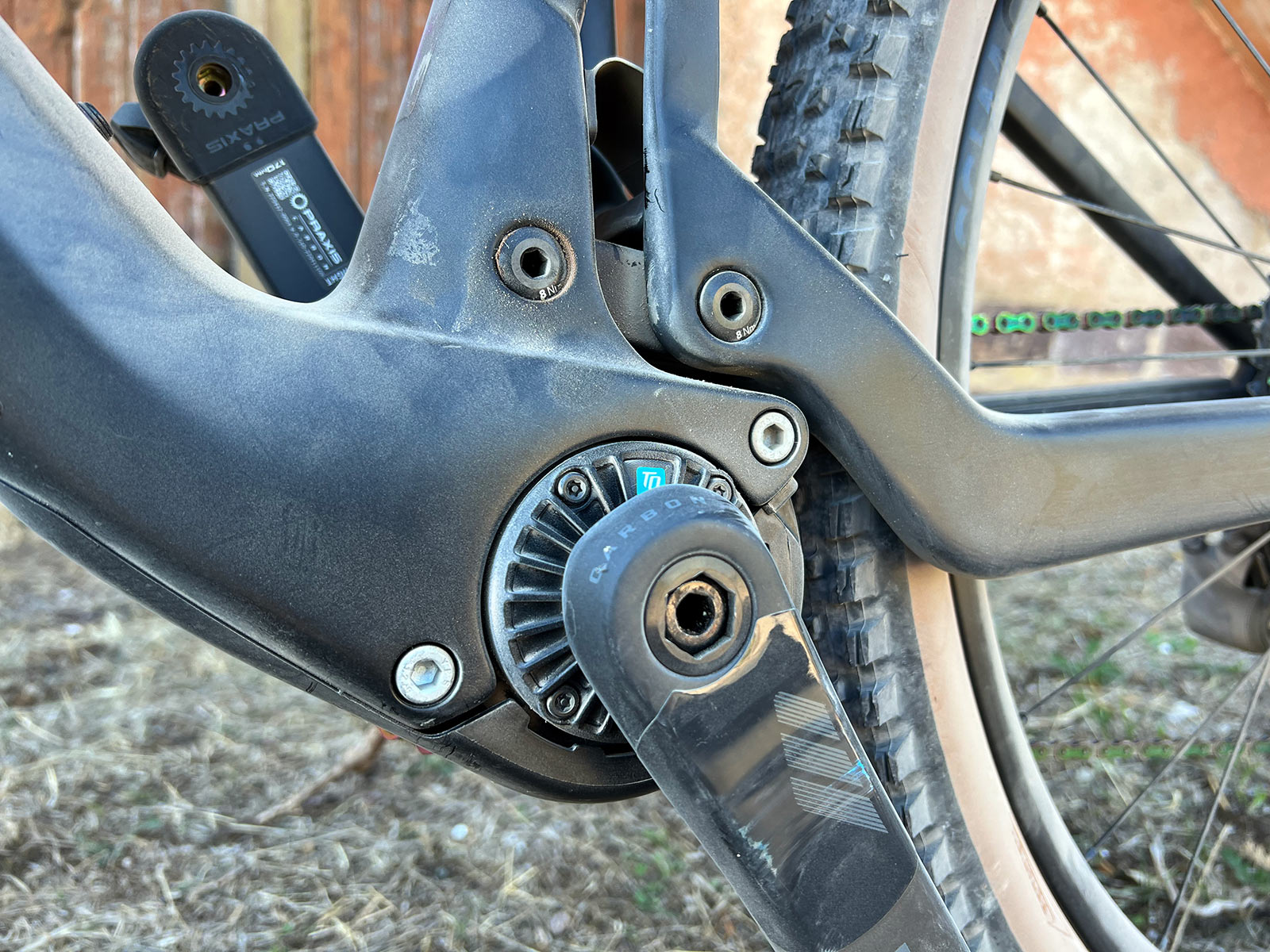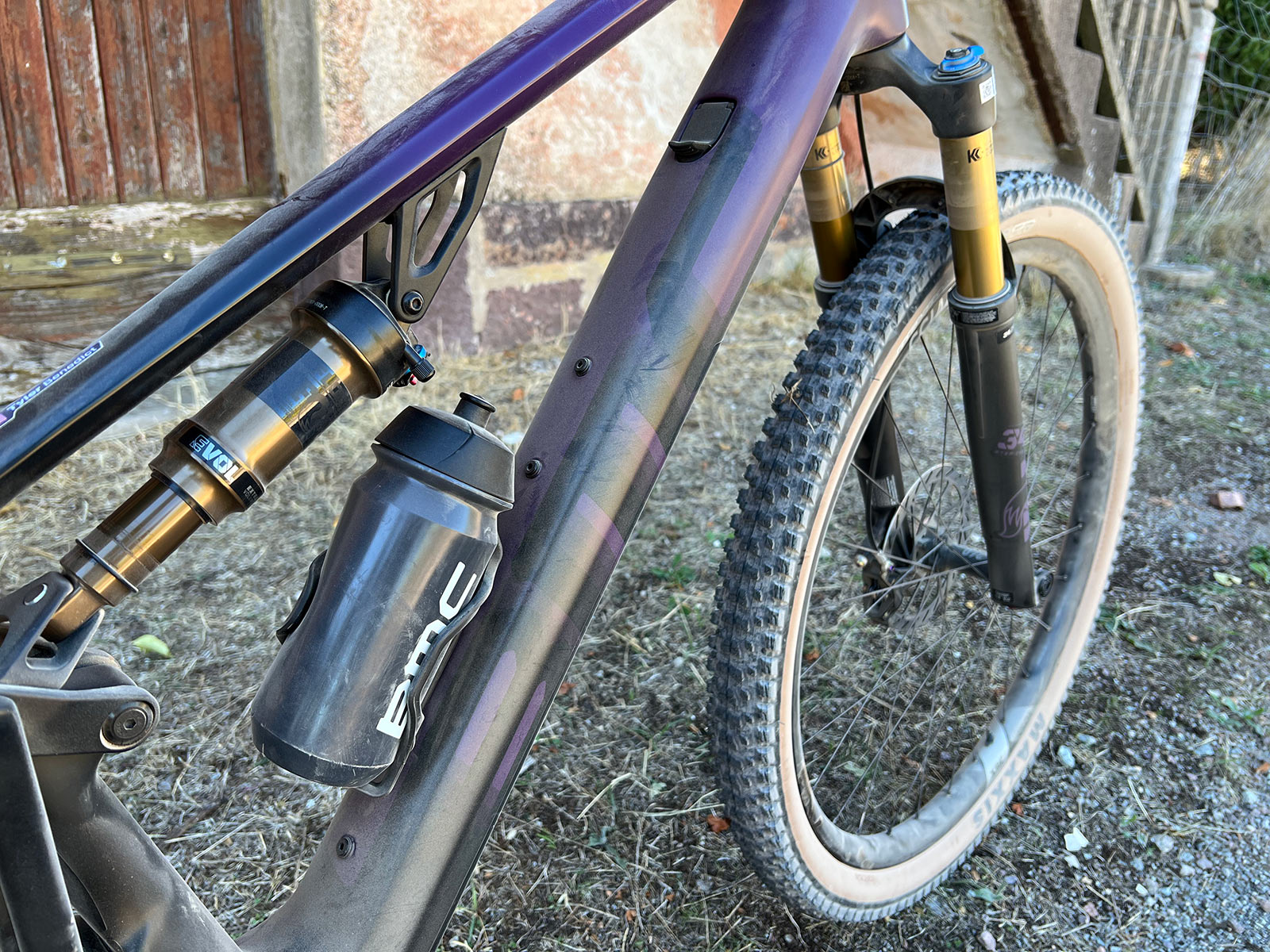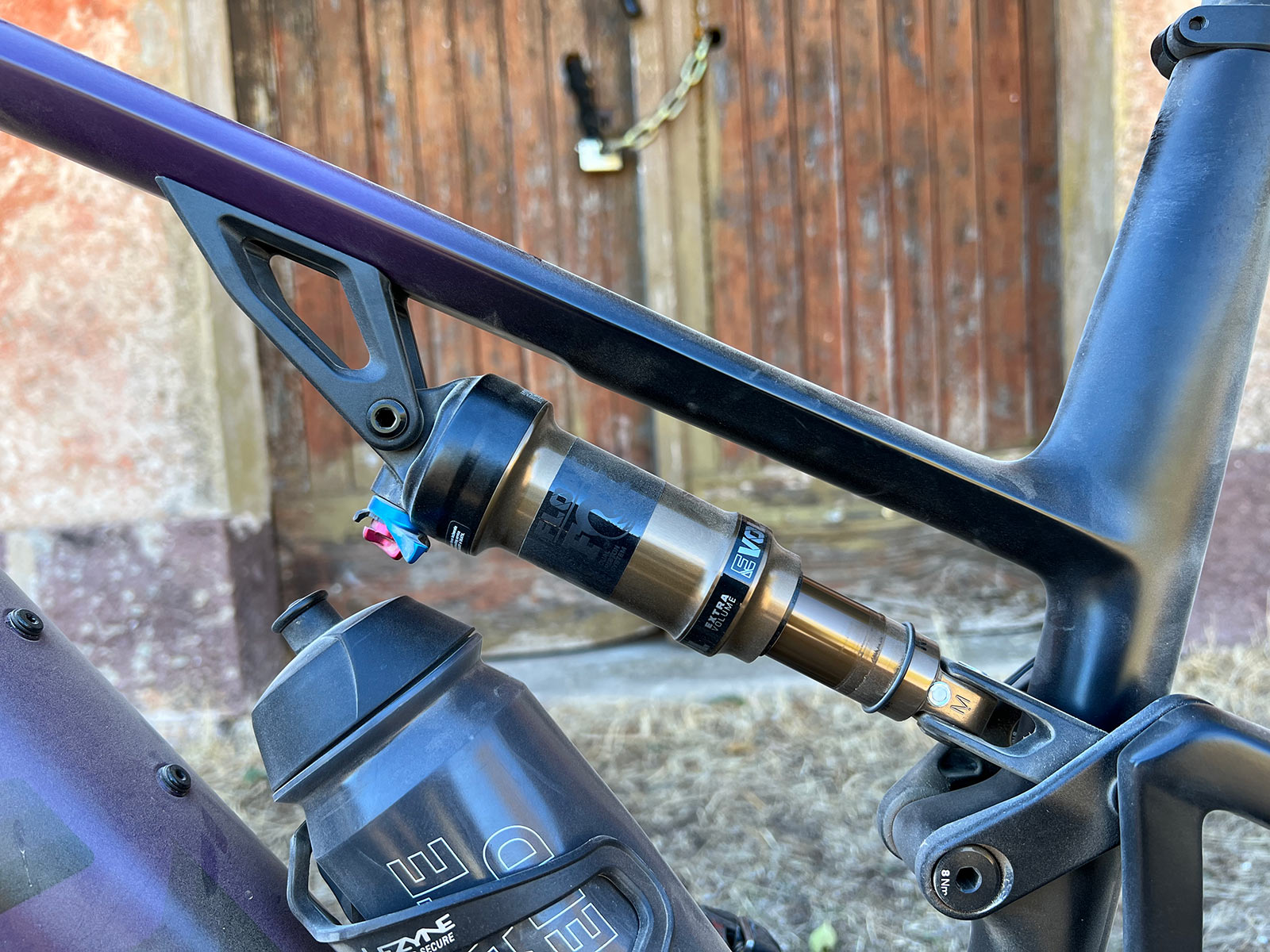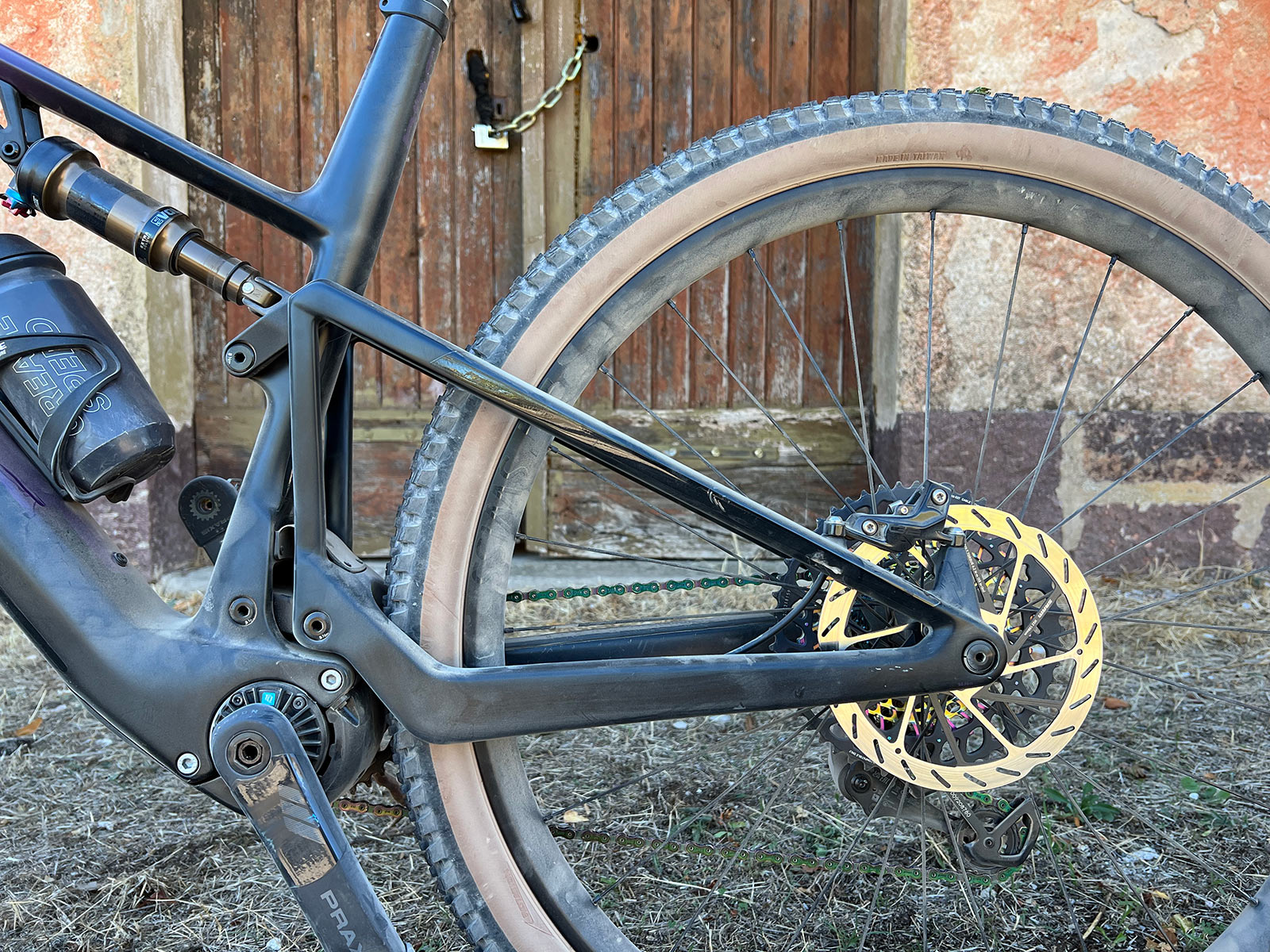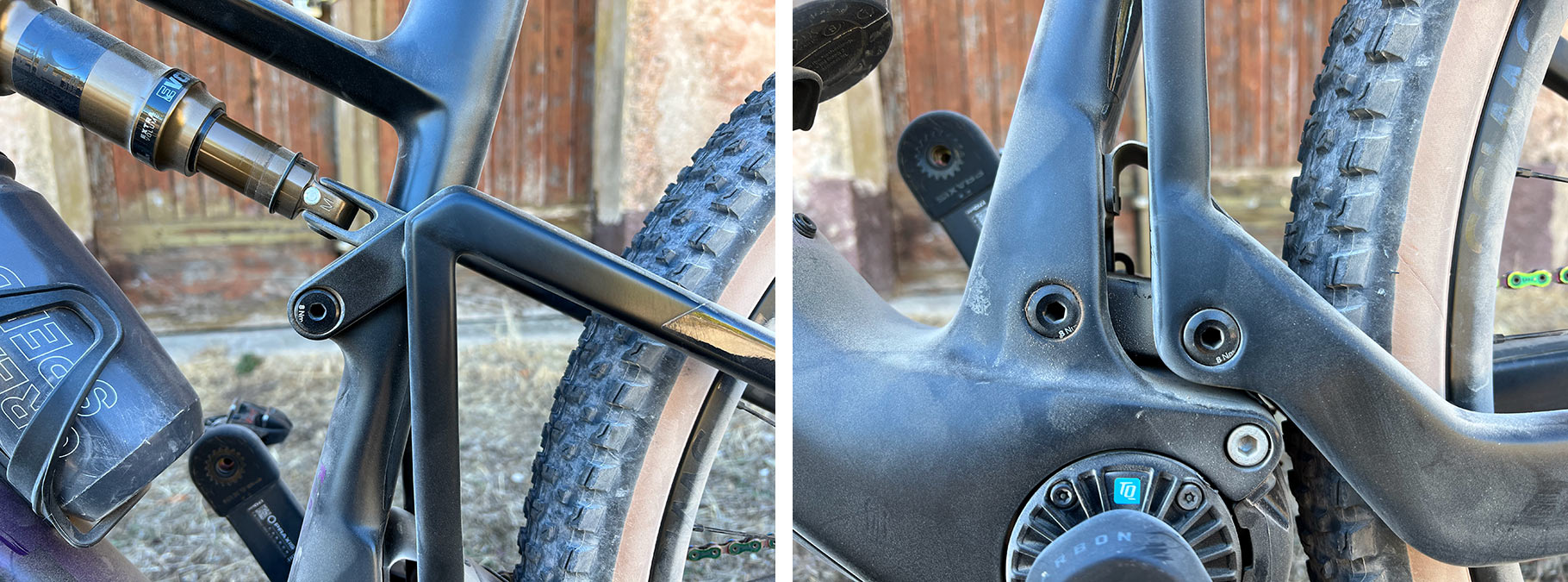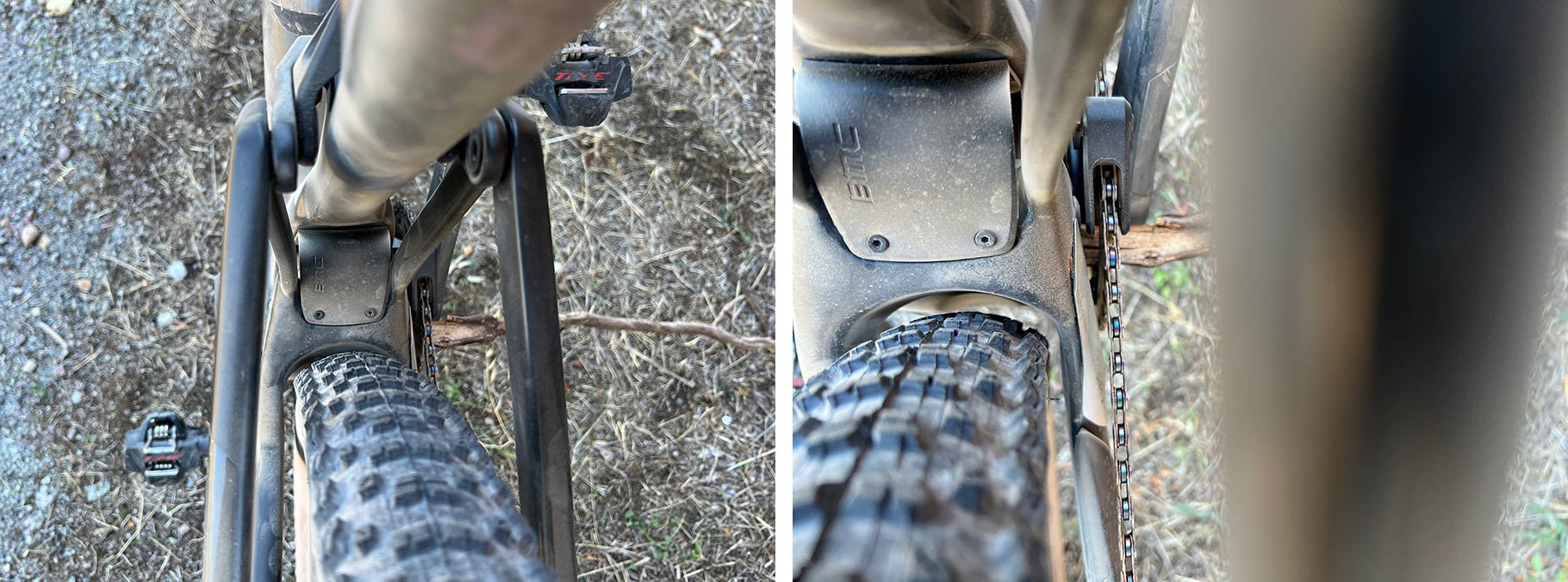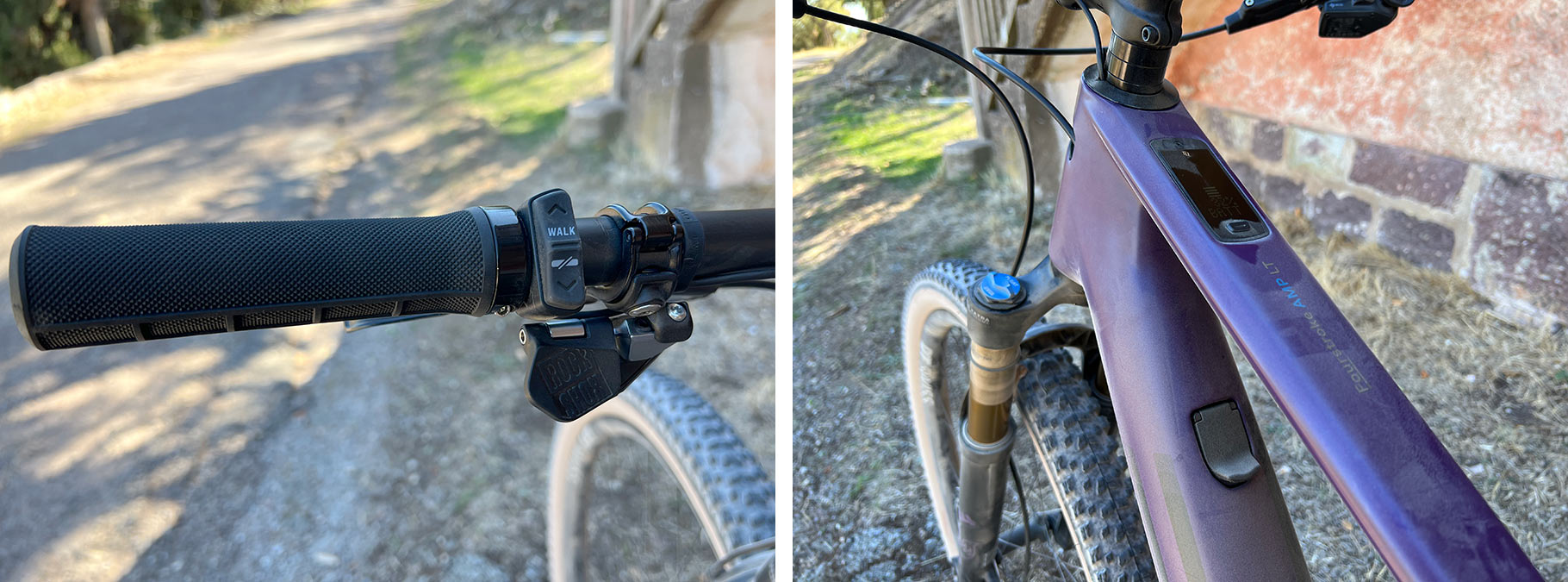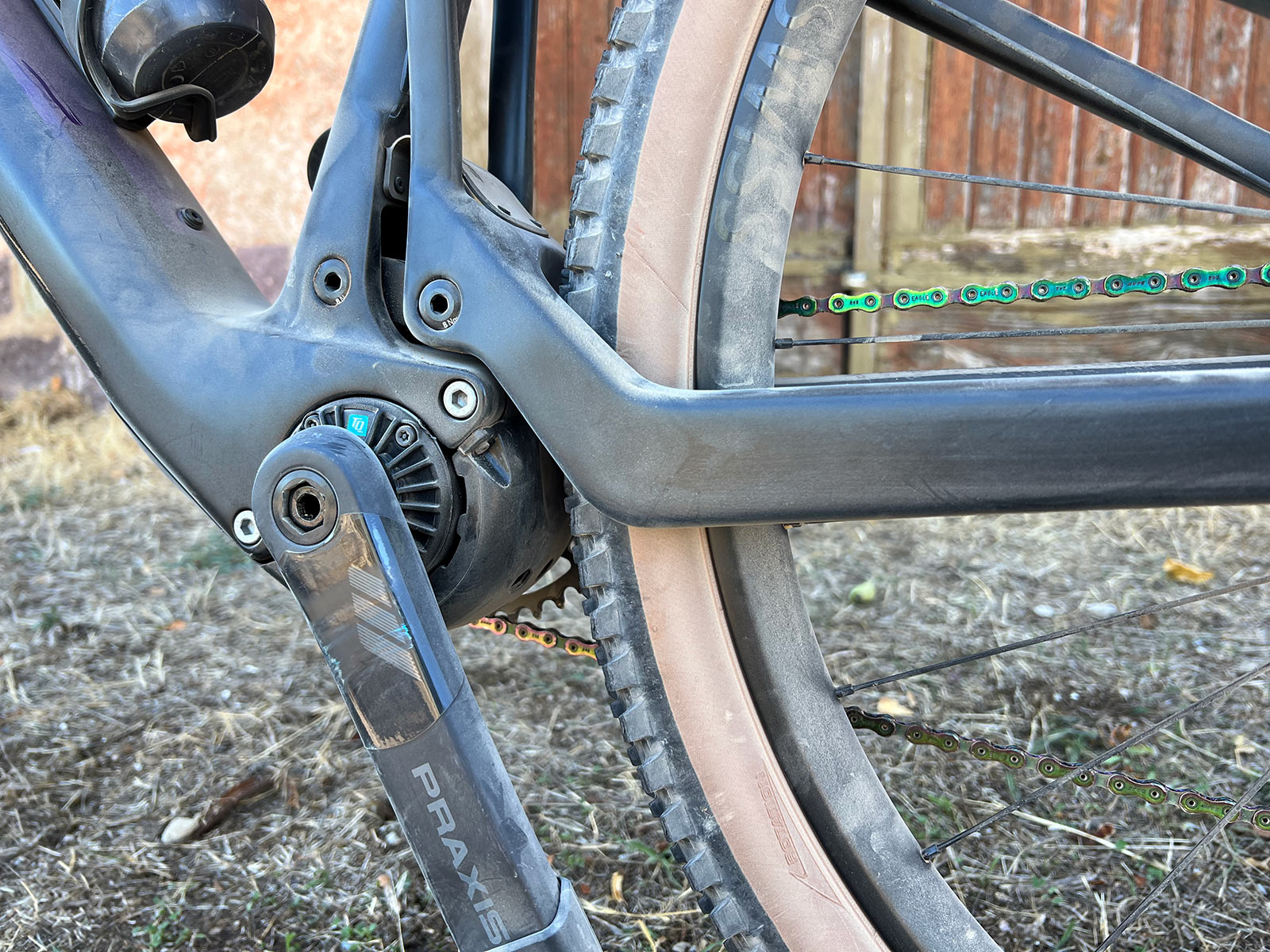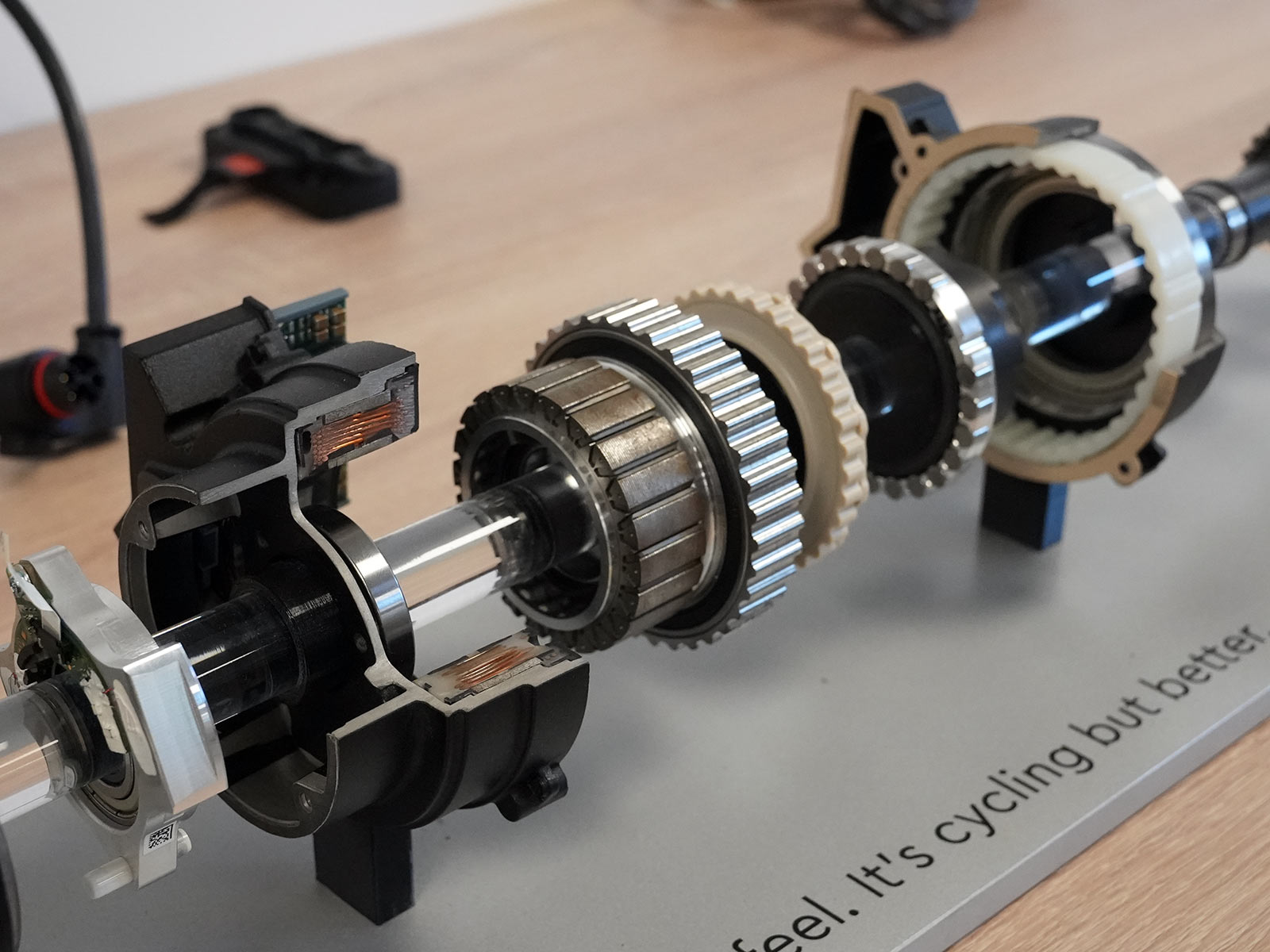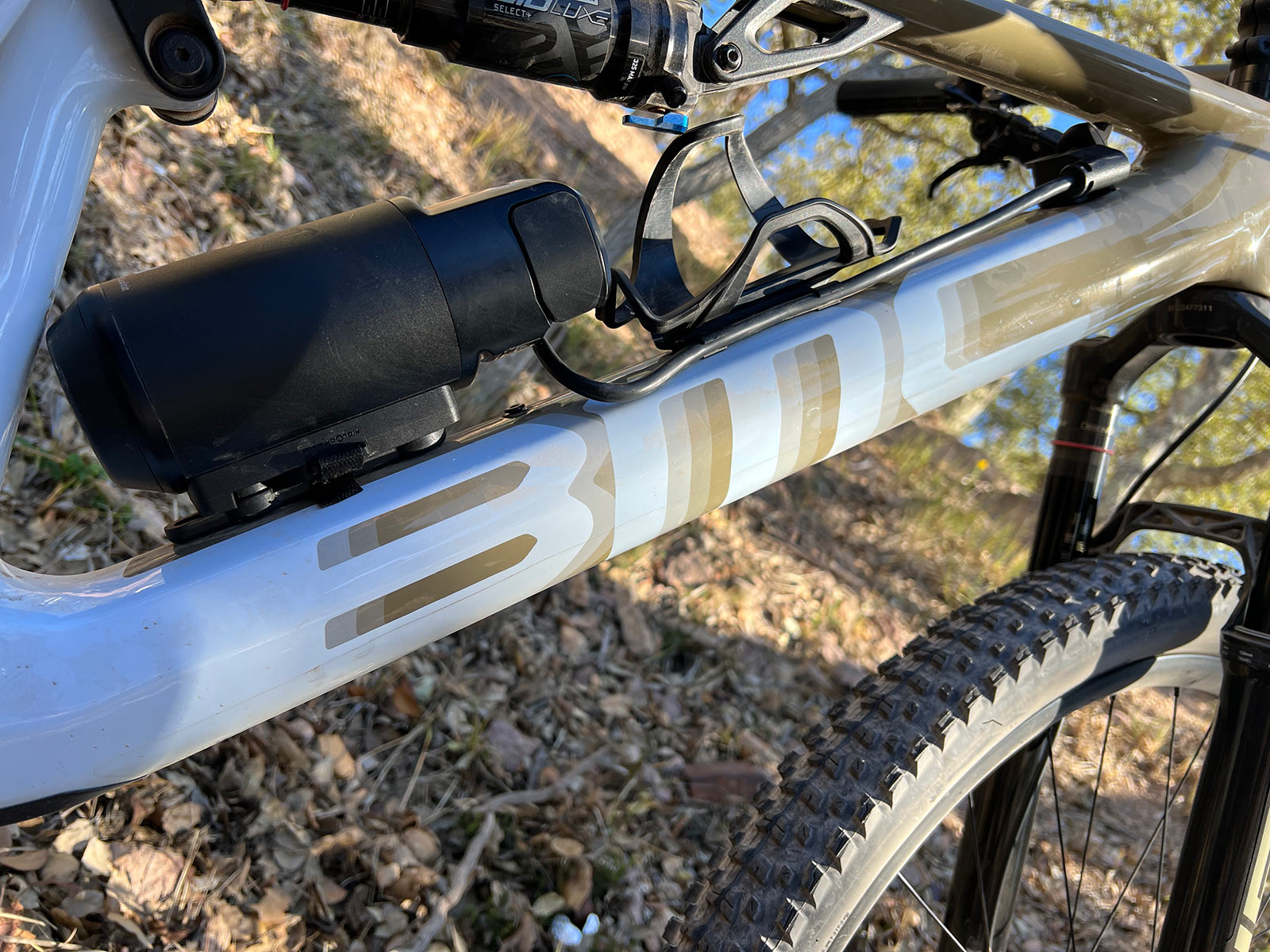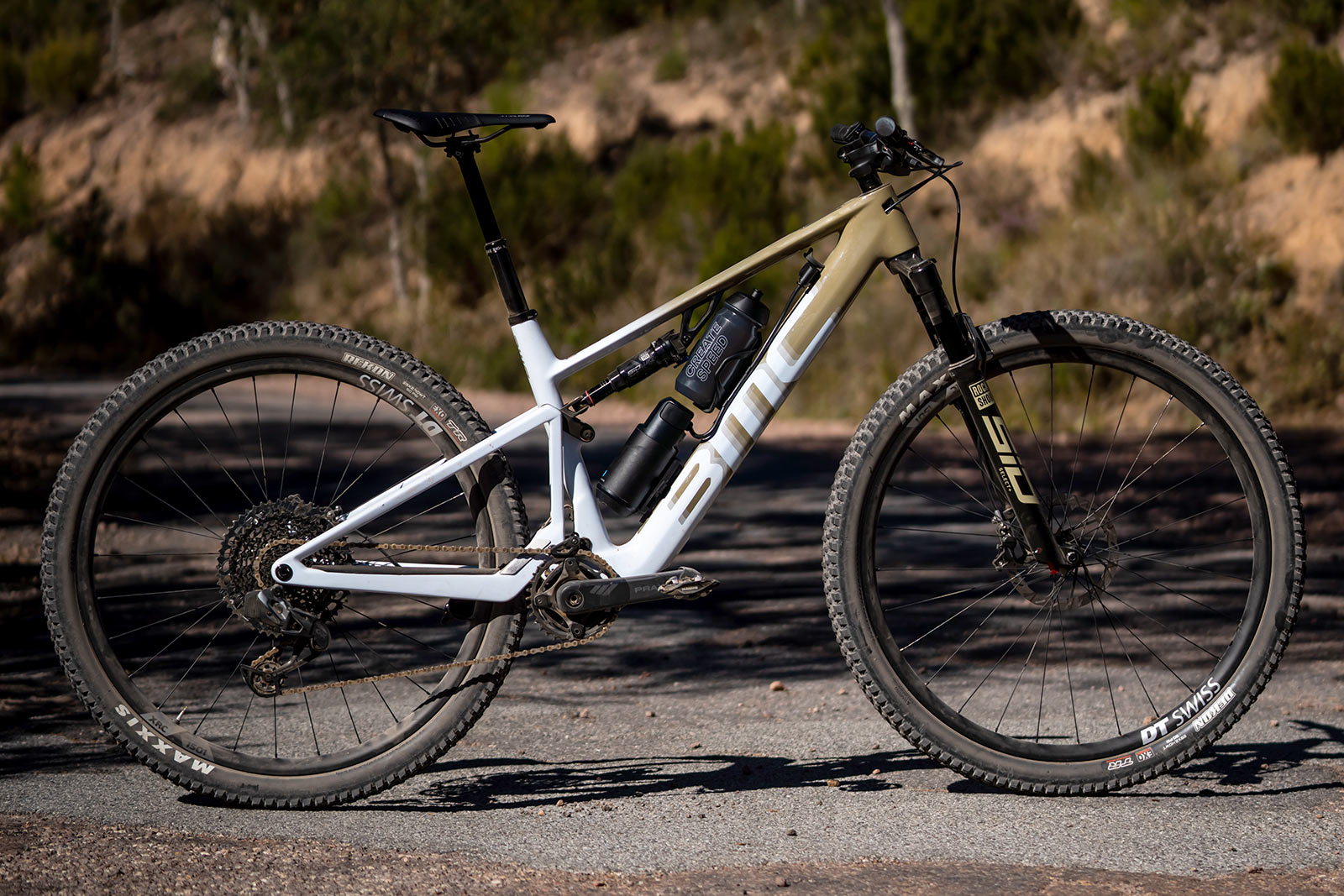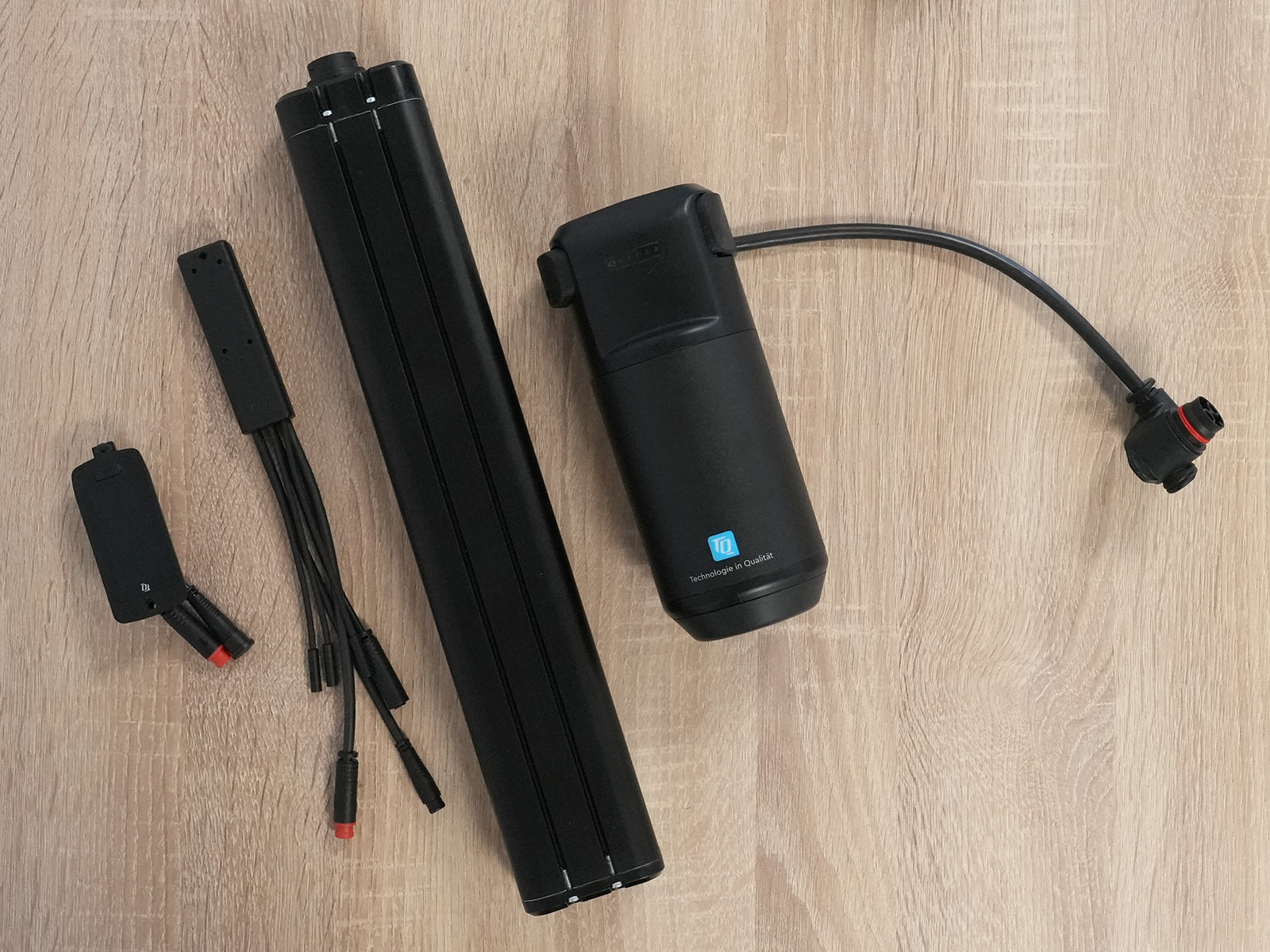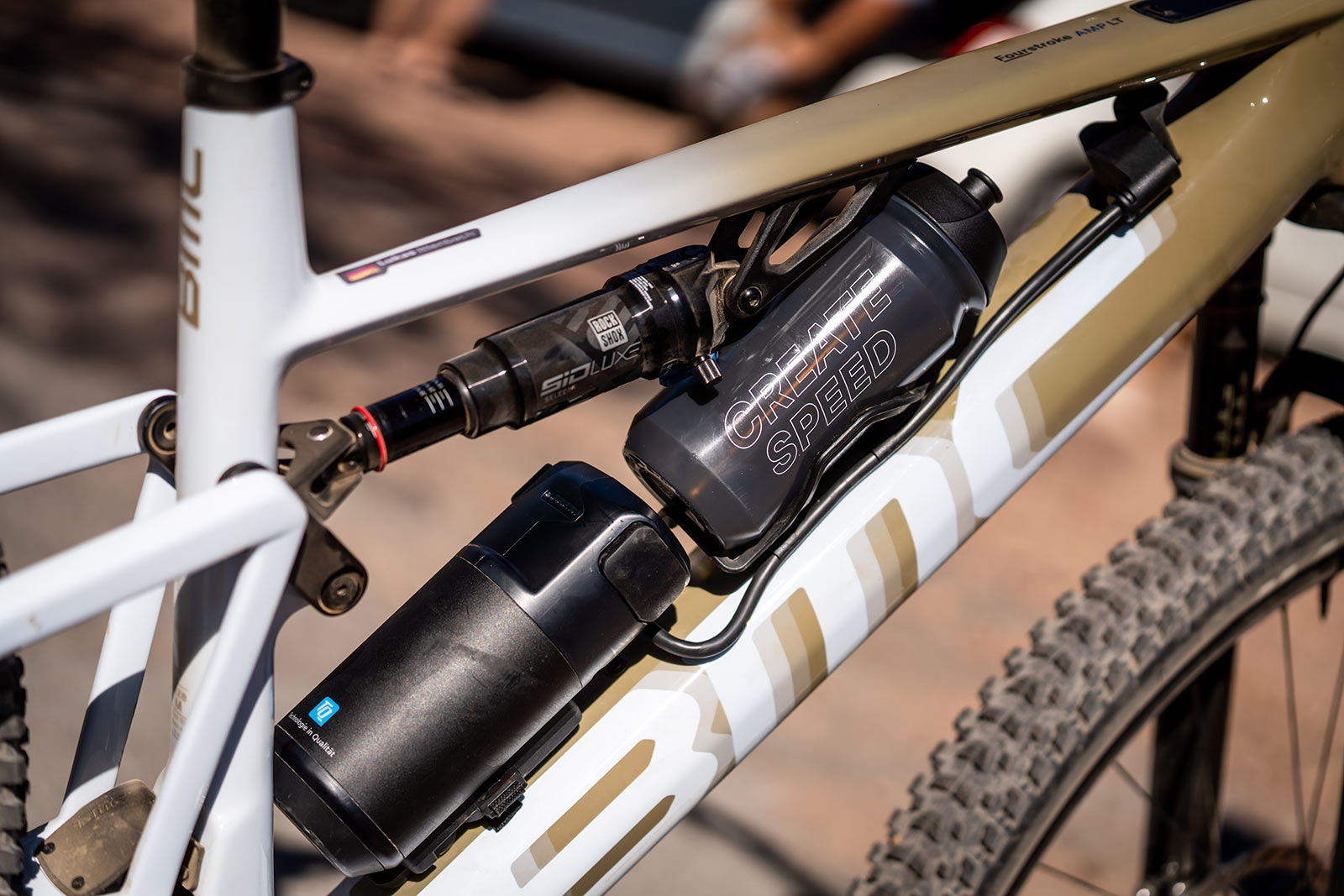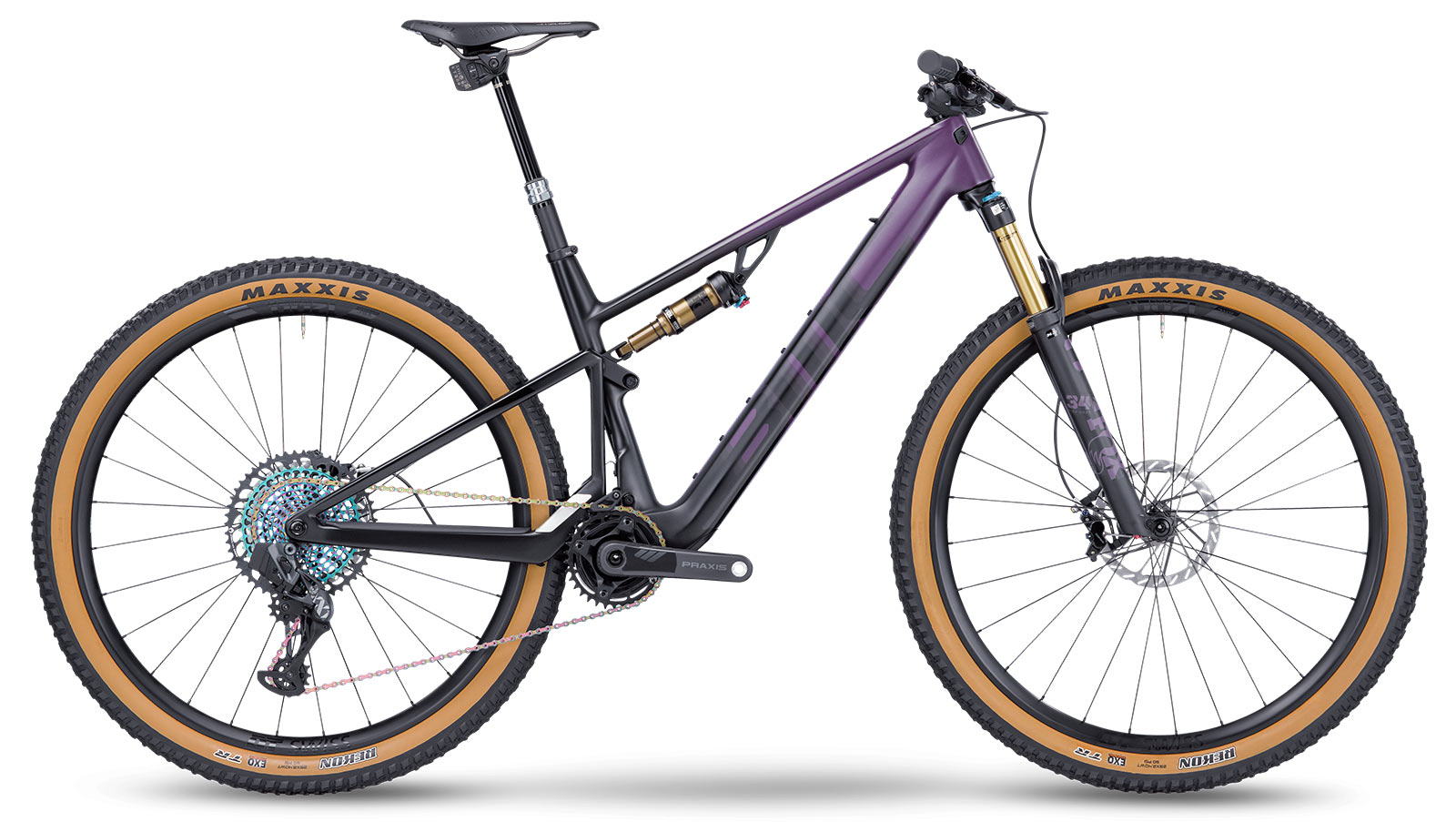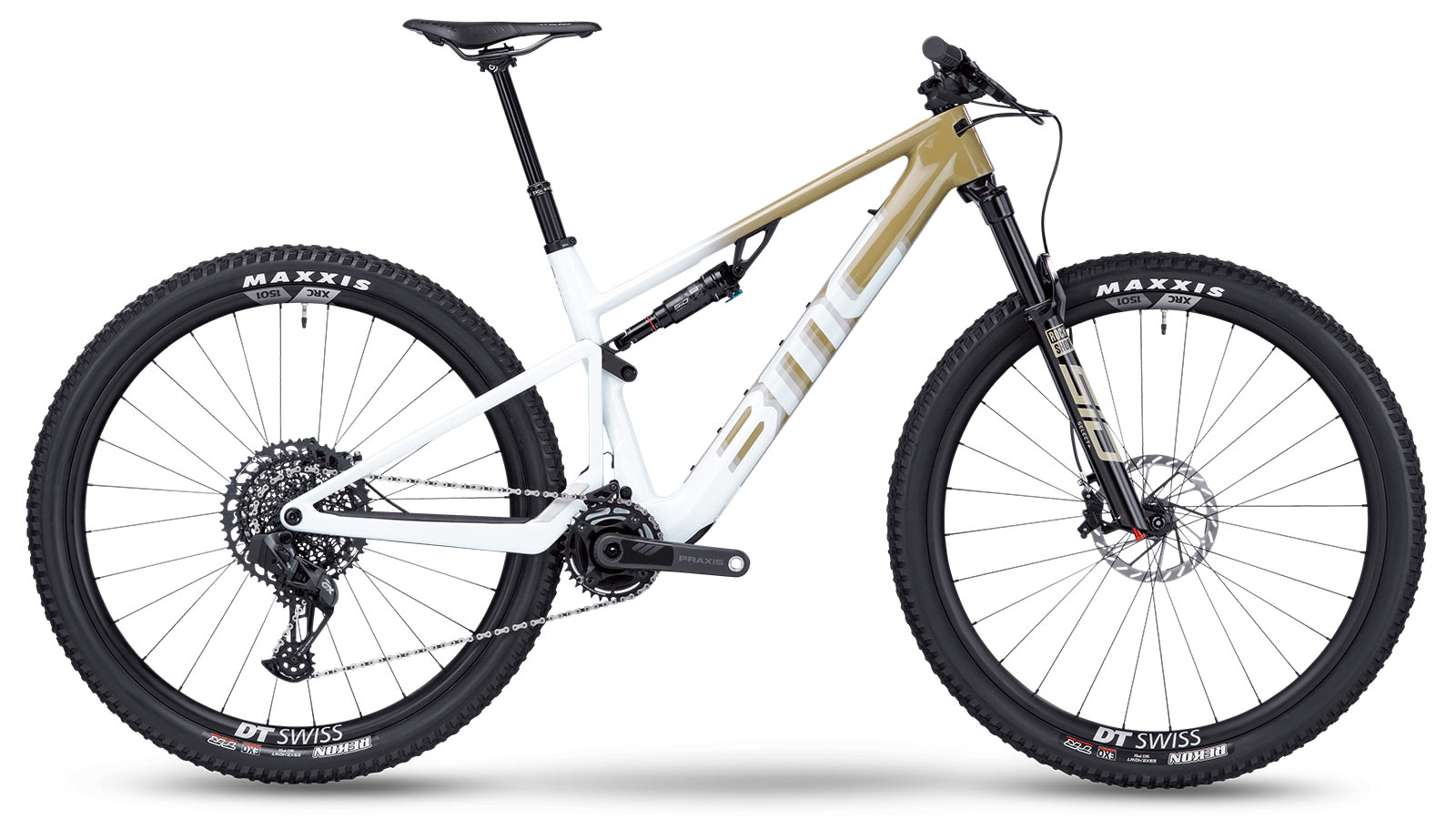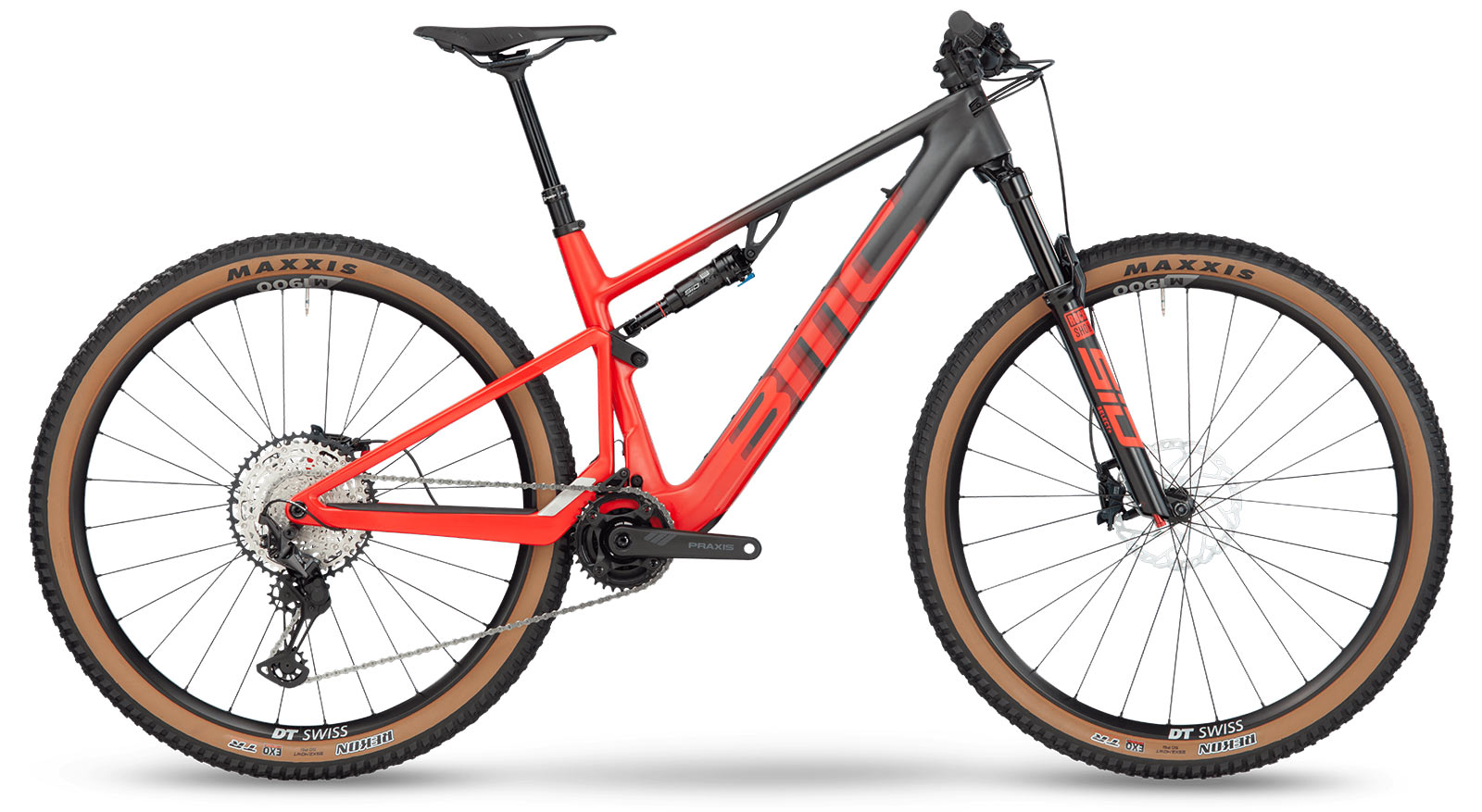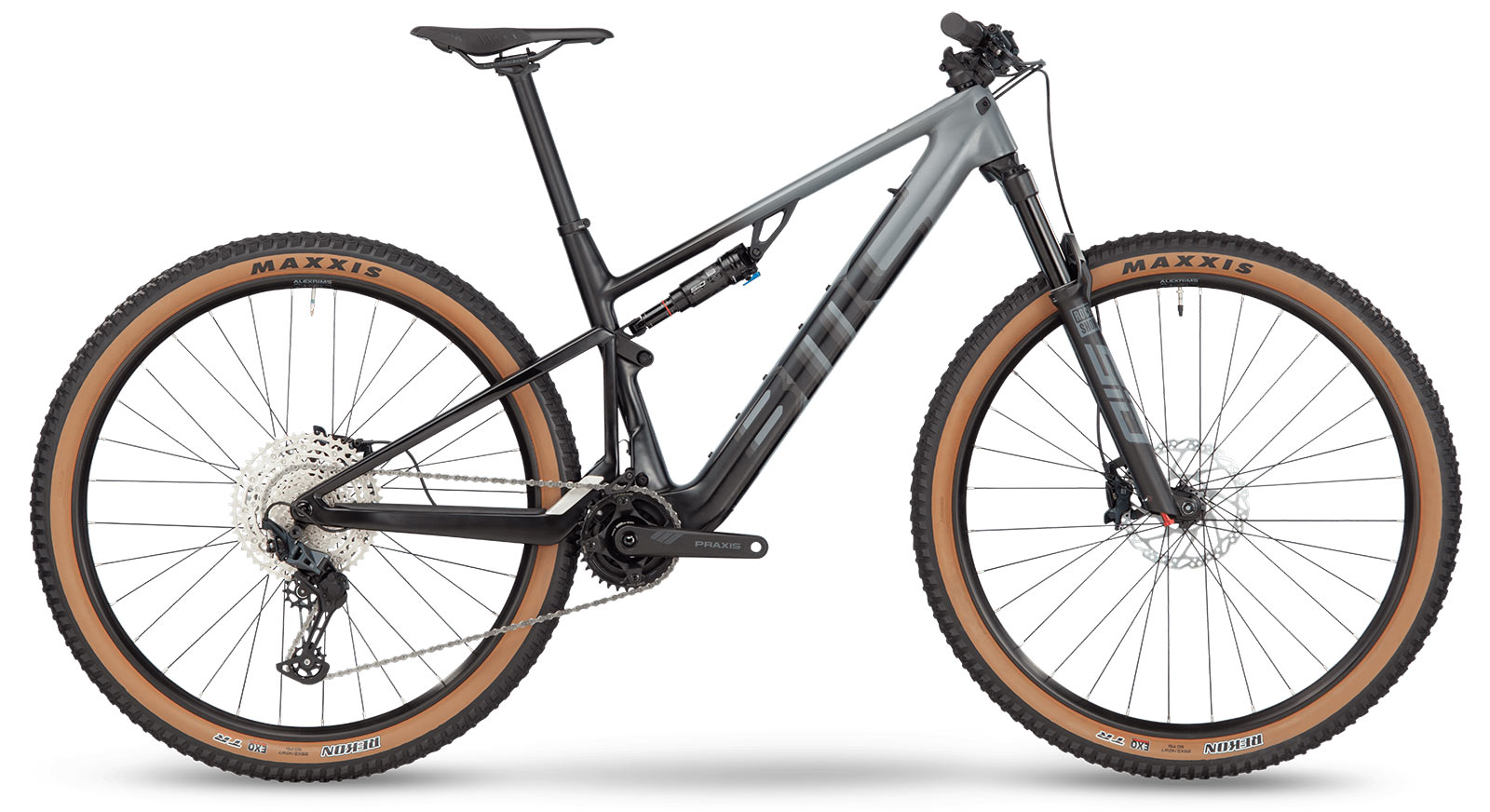Joining the three-model analog BMC Fourstroke family introduced last week, the new Fourstroke AMP LT is the motorized eMTB version. It has the same 120mm travel front and rear as the standard LT model, shares 95% of its geometry, but tweaks the APS suspension slightly to make room for the whisper quiet TQ-HPR50 motor.
At a glance, you’d be hard pressed to tell this is an e-bike. The downtube houses the battery, but they made it as slim as possible while still fitting fully sleeved cable, hose, and wire guides running alongside the battery.
The geometry has the same 66.5º head angle, with a 40mm BB drop and 170mm cranks. Chainstay length is just 3mm longer, and the larger frame sizes will have slightly shorter reach figures.
The motor is tiny, and has a narrow Q-factor, so it feels and pedals like a regular bike.
Basically, the Fourstroke AMP LT rides every bit as nimble and capable as the pedal-powered version, but with enough assist to make those big days a little bigger.
Like the regular LT, the AMP LT gets 120mm front and rear wheel travel. And it keeps the five bottle bosses in the downtube, letting you run two bottles inside the front triangle on all frame sizes!
The lightweight frame, motor, and build mean they can use lightweight suspension. Inline rear shocks are paired with Rockshox SID or Fox 34 Stepcast forks.
The AMP frames get the same notched top tubes, creating space above the upper shock mount for remote lockout cables and other things they say are coming in the near future… (none of the LT models get remote lockouts)
It uses the same Advanced Pivot Suspension (APS) System as the others, which provides massive traction on the climbs and very active performance in the rough stuff while remaining efficient on the climbs.
The only difference here is that the lower linkage is placed higher to make room for the motor, but it rides almost identically to the analog bikes.
The bike fits up to 29×2.4″ tires front and rear. An integrated mud flap covers the lower linkage, and a chain guide prevents the chain from bouncing off the chainring.
The charging port is on the upper section of the downtube, and the display is embedded in the top tube. A single button turns it on and off and cycles through a limited selection of data points (battery percentage, remaining range).
The mode switch is on the handlebar, with long presses of the Up and Down buttons activating the Walk Assist mode or switching the motor off, respectively. Its slim form factor makes plenty of room for both AXS and mechanical dropper seatpost levers underneath.
Running silent, climbing steeps
The TQ drive unit is the same ultra-quiet system first introduced on the Trek Fuel EX-e. Check our full tech feature on the TQ system to see how it works without gears or belts.
It’s virtually noise free and pumps out 50Nm peak power. It’s a 300W motor that weighs just 1.85kg (~4lbs), paired with a 1.85kg 360Wh battery.
The AMP LT keeps the two-bottle mounting positions inside the front triangle, which is perfect for the upcoming TQ 160Wh range extender battery pack. The bottle-shaped battery pack has a long-ish cable, sized such that you can place it in the lower bottle cage position to keep the weight low, then run the cable through guides bolted under the upper bottle cage and plug it in.
This keeps room for a small water bottle on the bike, and maintains the high performance (and high style) characteristics BMC is known for.
TQ will offer their own app that’ll work with this bike, allowing you to customize the settings. You can also pair the system with any ANT+ compatible cycling computer to display more info than what’s shown on the built-in, intentionally minimal display requested by BMC.
BMC custom tuned the system settings to use full power in Boost mode, and the app will let you return to those stock settings if you start fiddling with it and don’t like your changes.
About that TQ Range Extender…
The Range Extender is optional, sold separately from the bikes, and uses a different battery technology than the main battery inside the downtube.
The main battery uses High Capacity cells, letting them pack more power into a smaller space. These cells deliver power evenly until it reaches 10% remaining power, then it will “down step” itself and limit the power to Eco mode to preserve a little more range.
This is necessary because as the remaining wattage drops, it’s only able to output that lower power level., but it’s also a nice safeguard to help you eke out a little more range before the bike becomes “analog”.
The Range Extender battery, however, uses High Output cells. This lets it deliver full power all the way until it’s empty. The reason is that when you plug this into the bike, it’ll use the range extender’’s power first, then switch to the main battery once its drained.
By letting the auxiliary battery run full blast until it’s dead means that when the bike switches to the main battery, there’s no difference in performance…it stays at full power.
It’s worth noting that the Range Extender can be left plugged into the bike…it has its own charging port that’ll charge both it and the main battery with by plugging the wall outlet into it.
The batteries will charge in reverse order of how they’re used, though…the main battery will fill up first (getting to 80% power in just 90 minutes), and then the Range Extender will charge afterward.
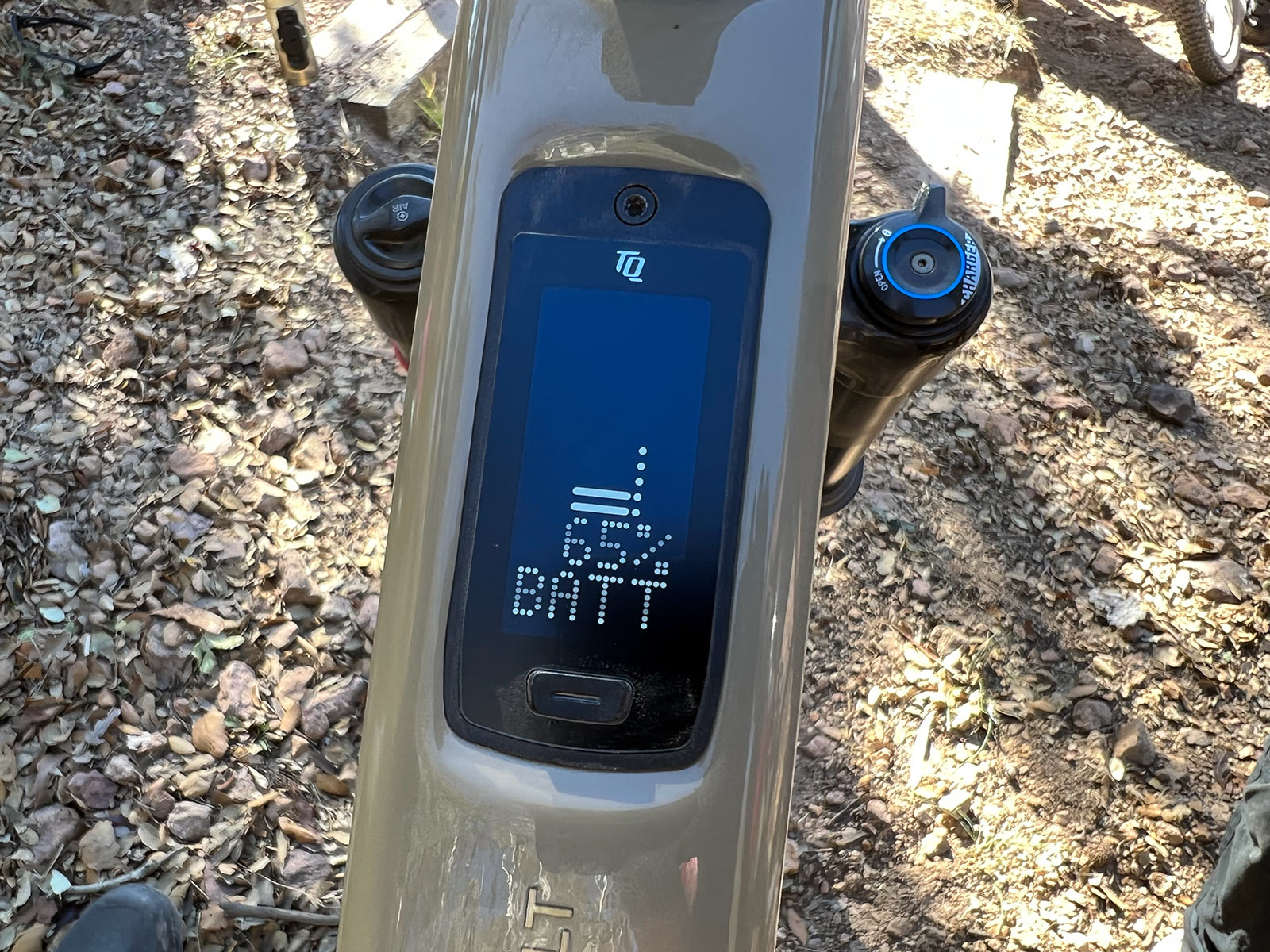
If you’re trying to time it all, the last 20% of the main battery will take about another hour to fully charge, and then it’ll take about 90 minutes to fully charge the Range Extender. So, to be safe, give yourself six hours to make sure everything is fully topped off.
The Range Extender battery kit will work with an optional custom Fidlock mount that has a proprietary locking system that prevents accidental release (and eliminates any rattling).
Fourstroke AMP LT claimed weights
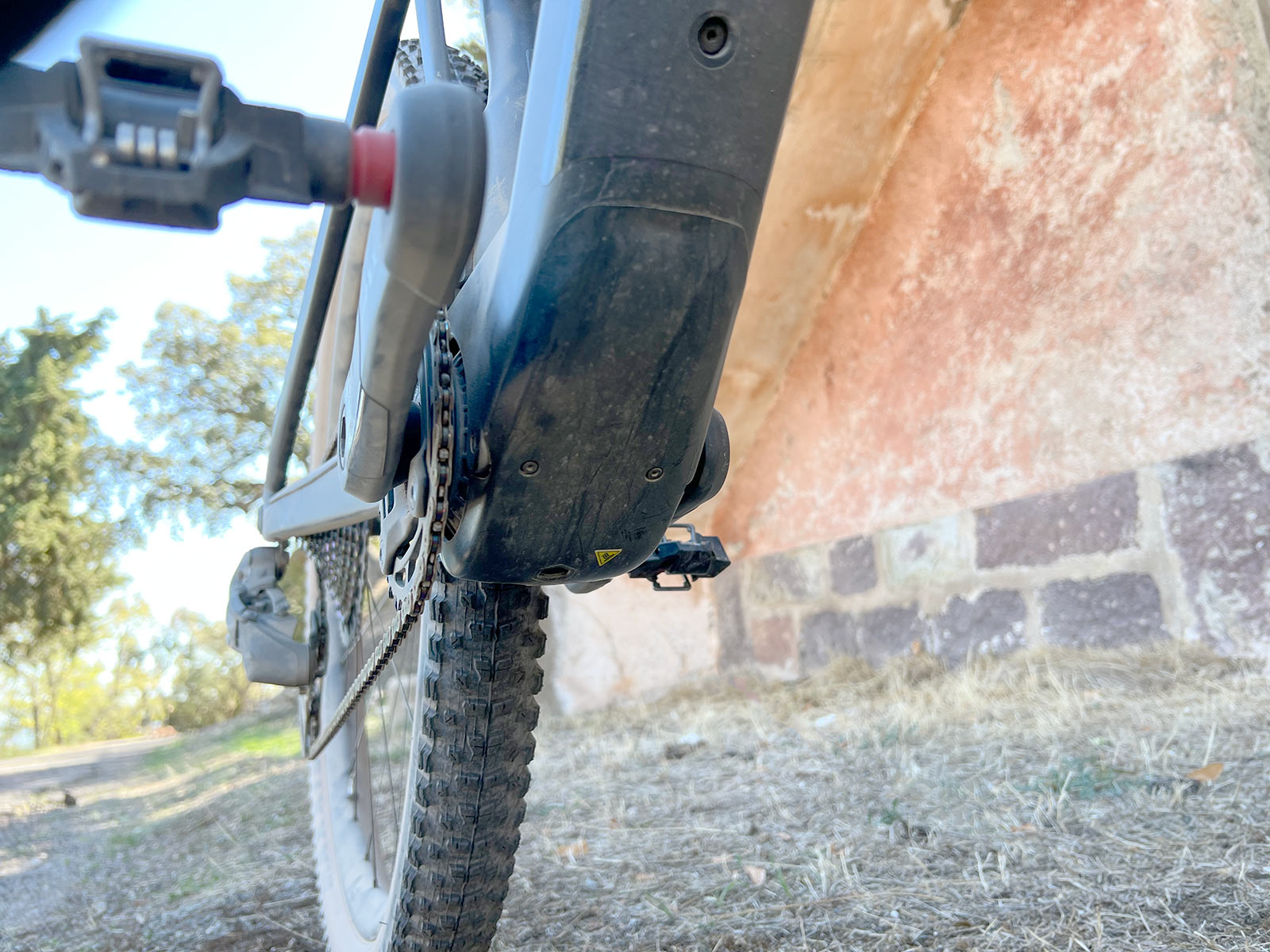
BMC’s goal was to create an e-MTB that rode extremely similarly to the analog Foustroke LT. A big part of that is the weight, so the AMP LT has a full carbon frame and uses standard (non e-bike specific) components.
And the TQ drive system is basically the lightest option on the market. The entire system, with motor, battery, wiring, remote, and display, only adds about 4kg (~8.75lbs) to the bike. The Range Extender battery pack with cable adds another ~1kg.
That let them get some incredibly light complete bike weights:
- Fourstroke AMP LT LTD – 15.9kg (~35lb)
- Fourstroke AMP LT One – 16.6kg (~36.6lb)
Weights for the TWO and THREE models are TBA.
Fourstroke AMP LT Pricing & Availability
Fourstroke AMP LT is available in four sizes (S, M, L, XL) and seven models.
- LTD is available from December 2022 and costs €13,999 / $14,999
- SRAM XX1 Eagle AXS, Praxis carbon crank, G2 Ultimate brakes, Reverb AXS, Fox 34 SC Factory fork, DT Swiss XRC 1200 wheels
- ONE is available from December 2022 and costs €9,999
- ONE USA is available from April 2023 and costs $10,999
- SRAM GX Eagle AXS, Praxis carbon cranks, G2 RSC bikes, Rockshox SID Select+, BikeYoke Divine dropper, DT Swiss XRC 1501 wheels
- TWO is available from February 2023 and costs €7,999
- TWO USA is available from April 2023 and costs $8,999
- Shimano SLX w/ XT rear derailleur, SLX brakes, Praxis alloy crank, X-Fusion Manic dropper, Rockshox SID Select+, DT Swiss M 1900 wheels
- THREE is available from May 2023 and costs €6,899
- THREE USA is available from July 2023 and costs $7,299
- Shimano SLX/Deore mix, SLX brakes, Praxis alloy cranks, Rockshox SID RL, rigid seatpost, Alex MD30 rims with Shimano MT400-series hubs
The difference between the US and Global models is top assisted speed. All are considered “Class 1” bikes, but in the US that means a 20MPH limit, and in the EU and most other countries, it’s a 25km/h (15.5mph) limit.
